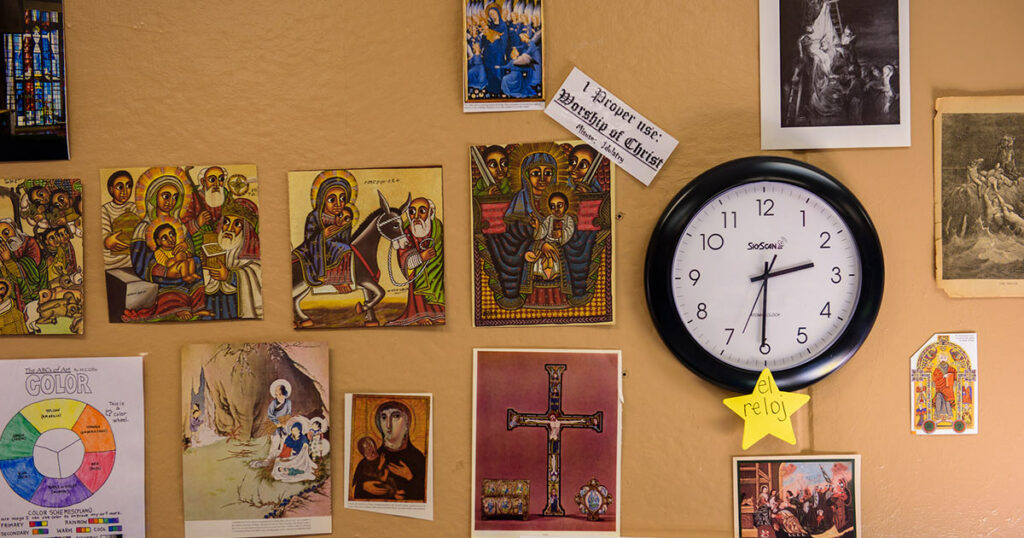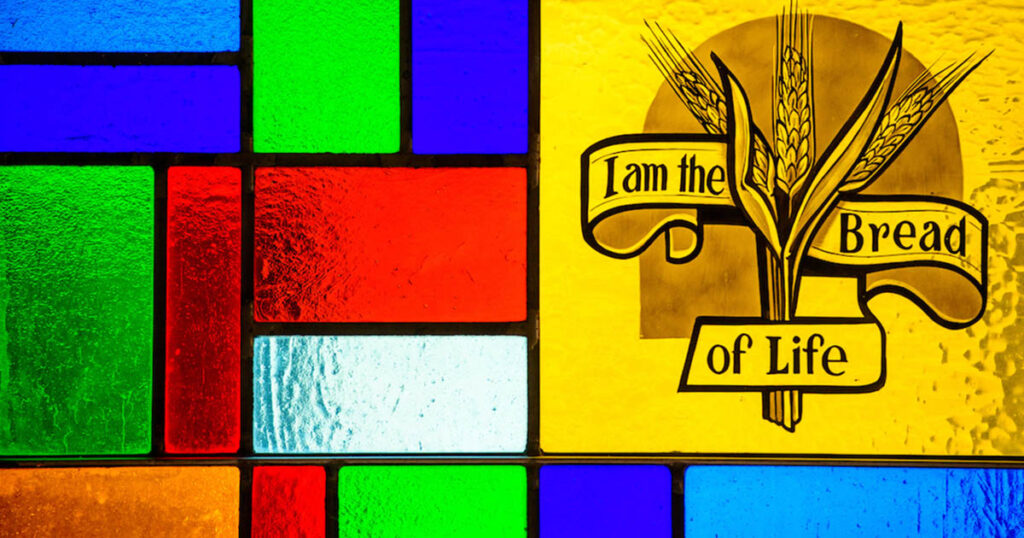5. We have the time … for Jesus to love us so much.
The second most common objection to recovering weekly communion in the 1999 survey was that it takes too much time. While the Holy Trinity and the saints triumphant are outside of time, we struggle in and with time. Time may seem heavy as a day drags along or sleepless hours lumber through the night. Time may appear light and fleeting as another year or decade slips away, like a shadow or a flower that withers (Job 14:2).
Our time on earth is a precious gift from God, for our times are in God’s hands (Psalm 31:15). We pray, “O Lord, make me know my end and what is the measure of my days; let me know how fleeting I am!” (Psalm 39:4). We ask God, “So teach us to number our days that we may get a heart of wisdom” (Psalm 90:12).
Time is precious. Jesus’ love is infinitely more precious.
Our risen Lord comes among us in the Divine Service to provide refuge and security that we cannot provide for ourselves. We gather in His presence for a fraction of each week. We easily spend more than 80 minutes for a sporting event, movie, eating out with friends or relaxing in the great outdoors. But our inwardly-curved hearts easily complain about the 80 minutes to receive Jesus’ loving gifts.
While temptations to usurp time in the Divine Service for extraneous things abound, Christ serving His people at His Table is never extraneous. All week, the pastor prepared a sermon for Christ to speak to His gathered guests. The liturgy confesses the King of kings in our midst acting for us. Of all the voices in the world, only Jesus’ voice reveals and heals our hearts. Of all the food in the world, only His food prepares our bodies for the resurrection of all flesh. The Lord’s Supper is His doing, not ours, and He loves to give.
Questions about the time used to receive the Sacrament should be asked with Jesus Christ as the subject, not us. The question “Why should we use 10 or 15 minutes more to do this each week?” misses the mark. Such questions turn our thoughts back in on ourselves and away from Christ. The question “Why should the living Christ desire time to do this for His gathered guests each Lord’s Day?” hits the target. Consider also a related, probing question: “Is our life really too busy to have Jesus serve us His holy food on our day of rest?”
In our time
From outside of time, the risen and ascended Christ steps into our time to serve us His holy body to eat and His holy blood to drink. In so doing, the living Christ, here and now, in the flesh, makes precious our time. We live in the fullness of time (Gal. 4:4–7), time that our Lord made full of life and salvation by redeeming us. He plans to unite all things in Him (Eph. 1:10). We receive a foretaste of this union at the altar.
We should make the best use of the time because the days are evil (Eph. 5:16). And so, we do good to everyone, especially to those of the household of faith (Gal. 6:10). We abound in love for one another (1 Thess. 3:12). Jesus comes to us with His gift, abounding with His love, to enable us to do good for others, to love others. “Why should the living Christ desire time to do this for His gathered guests each Lord’s Day?” Because He is love.
St. Paul wrote to Timothy:
Understand this, that in the last days there will come times of difficulty. For people will be lovers of self, lovers of money, proud, arrogant, abusive, disobedient to their parents, ungrateful, unholy, heartless, unappeasable, slanderous, without self-control, brutal, not loving good, treacherous, reckless, swollen with conceit, lovers of pleasure rather than lovers of God, having the appearance of godliness, but denying its power.
(2 Tim. 3:1–5)
The actions of self-love shown in this list prevent us from loving others. Jesus said that in these end times, the love of many would grow cold (Matt. 24:9–14). He comes to help us with His love, a close, intimate, steadfast, certain love delivered to our mouths by God in the flesh.
Undeserved love
In a Christmas Day sermon Dr. Norman Nagel once proclaimed:
Almighty God can do what He likes. But can He love us so much — can holy God love us so much — as to put Himself into our messed-up lot, into what happens to us for our sake, to be our Savior? The heart of unbelief is to refuse to be loved so much. God can love others perhaps, but not me. Or we may think we deserve God’s love, which is also refusal of His love. We would have God deal with us another way, not with undeserved love but in a way which we would have ourselves to thank, at least for some of it.
Norman Nagel, Selected Sermons (St. Louis: Concordia Publishing House, 2004), 30–31.
Unbelief refuses to be loved by God in Christ Jesus. This statement echoes Jesus explaining the convicting work of the Holy Spirit: “He will convict the world … concerning sin, because they do not believe in me” (John 16:9). This unbelief is the sin that condemns. The Holy Spirit bestows the gift of believing in Christ’s atoning sacrifice as God’s undeserved love. The Holy Spirit also bestows trust in Christ’s delivery of forgiveness in His Holy Word and Holy Sacraments. The beating heart of Holy Communion and the liturgy is God’s love in Christ.
Christ is present “for you.” He comes with incarnate love “for you.” He joins Himself to you with His holy body and holy blood. Therein He gives His holiness to you to be received in faith. He comes, in the flesh, acting for you here and now in this gift. He comes with love you do not possess from within. He comes “for you” with love even greater than faith and hope (1 Cor. 13:13).
The way of love
Jesus gives you patient love at His Table; He knows your many failings and bears all things for you. He gives you love at His Table that does not insist on its own way. He is the way and invites you to follow Him in faith, but He forces no one. He gives you love at His Table that rejoices with the truth. He is the truth and covers all your wrongdoing with His cleansing blood. He gives you love at His Table that never ends. He is the resurrection and the life and gives you Himself. The living Christ, at His Table, loves you with boundless love. You cannot be loved too much by Him, and He never tires of loving you this much.
As we sing, “By Your love I am invited, Be Your love with love requited; By this Supper let me measure, Lord, how vast and deep love’s treasure” (LSB 636:8). Our time speeds along. Soon years on earth are past. As we weigh time for the Divine Service each week, God’s love merits first place on the scale.
He does not deal with us according to our sins, nor repay us according to our iniquities. For as high as the heavens are above the earth, so great is his steadfast love toward those who fear him; as far as the east is from the west, so far does he remove our transgressions from us. As a father shows compassion to his children, so the LORD shows compassion to those who fear him. For he knows our frame; he remembers that we are dust. As for man, his days are like grass; he flourishes like a flower of the field; for the wind passes over it and it is gone, and its place knows it no more.
(Psalm 103:10–16)
Time is precious. Jesus’ love is infinitely more precious. On earth, we will die and soon be unknown. Jesus, however, prepares a place for us where He is (John 14:1–7) and where He knows us forever. Even now He knows us as His own and prepares a place for us at His Table.
Let me praise God’s boundless favor,
(LSB 620:5)
Whose own feast of love I savor,
Bidden by His gracious call.
Wedding garments He provides me,
With a robe of white He hides me,
Fits me for the royal hall.
One post-communion prayer asks God to strengthen us through the Sacrament “in faith toward You and in fervent love toward one another.” Such faith and love only comes from Him.
Let this food your faith so nourish,
(LSB 627:10)
That its fruit of love may flourish
And your neighbor learn from you
How much God’s wondrous love can do.






J love these articles so much especially since I will soon be 90 and God has given me a wonderful life and taken such good care of me. Yours in Christ Gerri